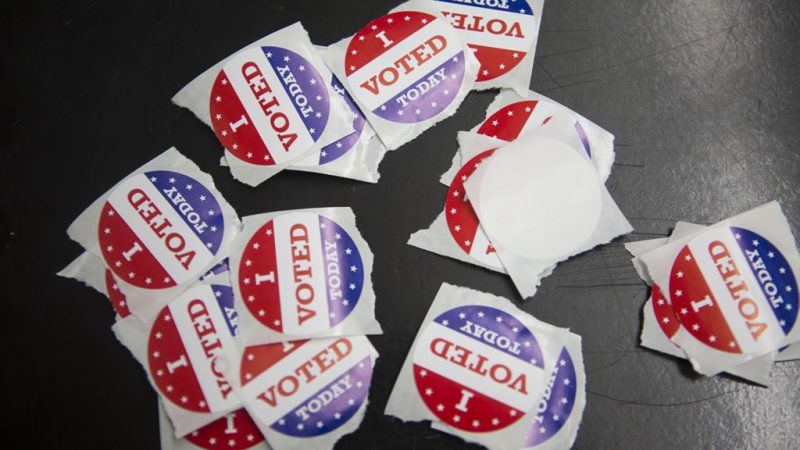A federal judge lamented an increasing public health crisis that the Legislature and Gov. Tony Evers have “refused to accept as sincere enough to stop” Tuesday’s election.
Still, U.S. Judge James Conley said yesterday he can’t act as a “super department of health for the state of Wisconsin” and stop the election. The remedy for that, he told parties in federal suits seeking changes to Tuesday’s election, lies with state government.
“We have three branches of government to ensure a system of checks and balances, and questions about our elections typically rely on all three playing a role,” he said. “If I could have changed the election I would have but I can’t without violating the law.”
Meanwhile, Evers said late yesterday he’d have made changes if he had the sole authority to do so.
But Senate Majority Leader Scott Fitzgerald, R-Juneau, quickly fired back, saying Evers had “not once” mentioned moving the election before yesterday.
Conley during the hearing said it may be a bad public policy decision to move ahead with the election amid the growing pandemic. But he expressed reluctance to push back the date.
“Is it my place as a federal judge to say, nope, Wisconsin doesn’t get to have an election at all?” Conley pressed an attorney for one of the parties seeking a delay.
Conley said during yesterday’s teleconference he was open to changes that would ensure clerks can count the rash of absentee ballots that have been issued for Tuesday’s election. But he also indicated he’d like more information on how the process of receiving and returning ballots is going before issuing a ruling.
“As much as I would like our Legislature and governor to stop the public health risk, I’m not sure that the voting right is being sufficiently impinged because voters do have a fairly robust absentee ballot option, which has now been taken advantage of,” he said.
Conley posed Wolfe the questions during a hearing on three federal lawsuits seeking changes to the April 7 election that have been combined into one case. The suits as for various remedies, including moving the election day to reworking how absentee ballots will be treated.
Earlier in the hearing, Conley posed a series of questions to Elections Commission Administrator Megan Wolfe, including the impact of moving the April 7 election to May 12, when voters in the 7th CD will head to the polls in a special election to fill that House seat.
Wolfe noted ballots are already out for the 7th CD, meaning it couldn’t be added to a ballot with the April races. There also would be challenges for local clerks in the 7th needing two separate poll books, one for the congressional race and one for the other contests.
Conley said Wolfe’s answer suggested to him moving next week’s election to May 12 would “probably create more problems than you can solve.”
Wolfe answered that the entire year was challenging with the May special election, an August statewide primary and the November general election. She said that means there are very few days left in the year when there wouldn’t be overlapping deadlines
“No matter what day you chose, there’s going to be a different set of issues for us to consider,” she said.
As part of his questioning, Conley also ran Wolfe through a host of scenarios if he were to alter the deadlines for absentee ballots to be received and counted.
Currently, they must be received by 8 p.m. on Election Day to be counted.
Assembly Speaker Robin Vos said he would be comfortable if a federal judge orders a longer-than-normal window to count absentee ballots as requests have now topped 1 million.
Still, Vos said he wants to maintain a cut off for when absentee ballots must be mailed. He said that would give voters who mail their absentee ballots Monday or Tuesday confidence that their votes will be counted. But it would avoid a scenario in which those who haven’t sent in their absentee ballots see the initial results in Tuesday’s races and then decide to request one.
Vos and Fitzgerald also told reporters on a conference call yesterday they continue to be confident it will be safe to vote at the polls in person on Tuesday.
Vos said he’s volunteering at a polling site next week, while his wife — former GOP state Rep. Michelle Litjens — is going to work at a different location. He also called on those who are bored of “watching Netflix” at home to volunteer and said he supports the guv’s idea of using members of the Wisconsin National Guard to staff some sites.
“We need people to step up. The election is going to happen. There is no doubt in my mind it is going to happen on April 7,” he said.
Fitzgerald said clerks and local officials have been creative in finding solutions to safely conducting in-person voting. He also noted that even though some municipalities have announced plans to reduce the number of polling places, absentee ballots are up dramatically. He said that should help avoid crowds at polling sites.
“The word is definitely getting out there. If you want to vote in this election, you’ve had ample opportunity to do that,” Fitzgerald said, though he noted later in the call there are likely to be lawsuits after the election.
Yesterday’s Marquette University Law School Poll found 51 percent of registered voters favored delaying the election, while 44 percent said it should go on as scheduled.



